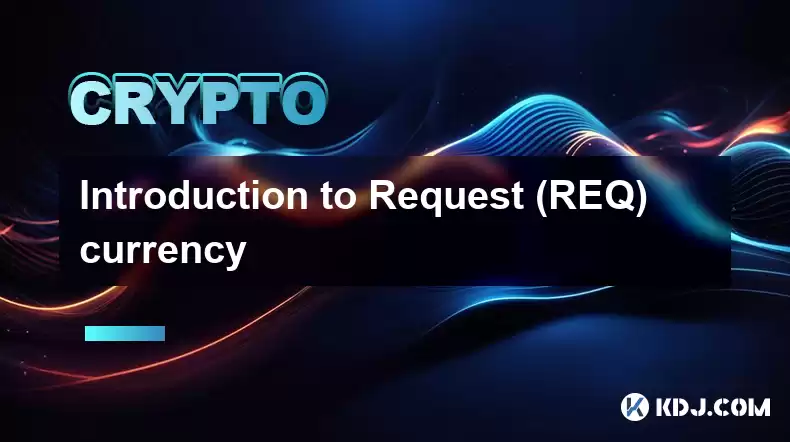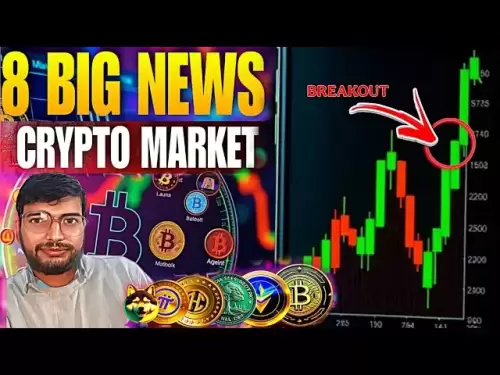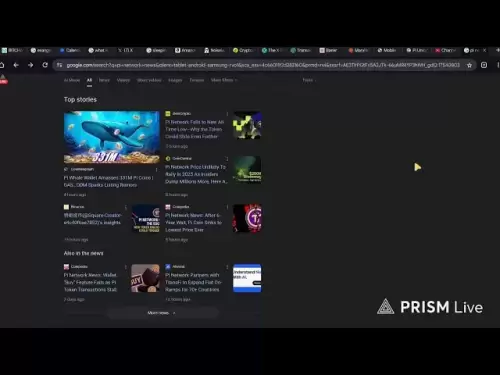-
 Bitcoin
Bitcoin $115200
-2.68% -
 Ethereum
Ethereum $3601
-5.16% -
 XRP
XRP $3.035
-2.96% -
 Tether USDt
Tether USDt $0.9997
-0.04% -
 BNB
BNB $764.5
-5.43% -
 Solana
Solana $168.1
-5.92% -
 USDC
USDC $0.9998
-0.02% -
 Dogecoin
Dogecoin $0.2090
-4.80% -
 TRON
TRON $0.3272
-0.49% -
 Cardano
Cardano $0.7306
-5.00% -
 Hyperliquid
Hyperliquid $39.16
-12.22% -
 Stellar
Stellar $0.3967
-4.96% -
 Sui
Sui $3.566
-5.95% -
 Chainlink
Chainlink $16.55
-6.57% -
 Bitcoin Cash
Bitcoin Cash $552.3
-3.90% -
 Hedera
Hedera $0.2516
-4.69% -
 Avalanche
Avalanche $21.99
-5.75% -
 Toncoin
Toncoin $3.621
-0.28% -
 Ethena USDe
Ethena USDe $1.000
-0.03% -
 UNUS SED LEO
UNUS SED LEO $8.951
0.02% -
 Litecoin
Litecoin $105.9
-3.59% -
 Shiba Inu
Shiba Inu $0.00001232
-5.00% -
 Polkadot
Polkadot $3.640
-5.55% -
 Uniswap
Uniswap $9.048
-7.03% -
 Monero
Monero $301.8
-1.51% -
 Dai
Dai $0.9999
-0.01% -
 Bitget Token
Bitget Token $4.334
-3.66% -
 Pepe
Pepe $0.00001064
-6.17% -
 Cronos
Cronos $0.1367
-5.78% -
 Aave
Aave $259.2
-4.59%
Introduction to Request (REQ) currency
Request Network simplifies request-to-pay and invoice processing, enabling secure, transparent, and cost-effective payments through its decentralized network and native REQ cryptocurrency.
Dec 29, 2024 at 07:33 am

Key Points
- Request Network's mission is to provide a decentralized payment network that simplifies request-to-pay and invoice processing.
- The REQ token is the native cryptocurrency of the Request Network that powers transactions and enables network governance.
- Request has established collaborations with major players in the blockchain industry, including Ethereum, Polygon, and Binance Smart Chain.
- The Request Network has a strong community of developers and users that support the project's growth and development.
- Request has implemented security measures and audit processes to ensure the reliability and trustworthiness of its platform.
Introduction to Request (REQ) Currency
Request (REQ) is a decentralized payment network that aims to simplify request-to-pay and invoice processing. The network leverages blockchain technology to provide secure, transparent, and efficient transactions. The REQ token is the native cryptocurrency of the Request Network that serves as a medium of exchange, facilitates payments, and enables network governance.
How does Request Network Work?
- Request Creation: Users can create requests for payment through the Request Network platform. These requests include details such as the amount, recipient address, and a unique identifier.
- Payment Processing: The network matches payment requests with invoices and facilitates the transfer of funds between the parties involved.
- Governance: REQ token holders have the ability to participate in network governance by voting on proposed changes and decisions that affect the platform's future development.
Benefits of Using Request
- Decentralization: Request Network operates on a distributed blockchain, eliminating the need for intermediaries and reducing the risk of single points of failure.
- Cost-Effectiveness: Transactions on the Request Network are significantly cheaper compared to traditional payment methods, which can involve high fees and exchange rates.
- Transparency: All transactions recorded on the blockchain are visible and auditable, promoting transparency and accountability.
- Efficiency: The automated nature of payment processing reduces manual errors and speeds up the invoice-to-payment cycle.
Collaborations and Partnerships
Request has established strategic collaborations with several blockchain and cryptocurrency industry leaders, including:
- Ethereum: Integration with the Ethereum blockchain provides a solid foundation for Request's decentralized architecture and enables the execution of smart contracts.
- Polygon: Partnership with Polygon expands Request's reach to users on the Polygon network, offering faster and more cost-effective transaction options.
- Binance Smart Chain: Integration with Binance Smart Chain further enhances Request's accessibility and liquidity by tapping into the vast user base and network effects of Binance.
Community and Support
Request Network has a vibrant community of developers and users who contribute to the project's growth and adoption. The team actively interacts with the community through social media, forums, and online discussions. Additionally, Request offers dedicated support channels to address user inquiries and resolve technical issues.
Security Measures
Request Network takes security seriously and has implemented robust security measures, including:
- Code Audits: Regular audits by independent security experts ensure the integrity and reliability of the codebase.
- Encryption: All data stored on the blockchain is encrypted, protecting the privacy and confidentiality of user information.
- Multi-Signature Wallets: Network funds are managed through multi-signature wallets requiring multiple authorized parties for transactions to occur, enhancing security and minimizing the risk of unauthorized access.
FAQs
- What is the purpose of the REQ token?
REQ is the native cryptocurrency of the Request Network. It serves as a medium of exchange for payments, facilitates network governance, and powers the decentralized infrastructure of the platform.
- How does Request Network ensure transaction security?
Request utilizes encryption algorithms, multi-signature wallets, and regular code audits to safeguard user funds and maintain the integrity of transactions.
- What is the cost of using Request?
Request Network provides competitive transaction fees compared to traditional payment methods. The actual fees depend on the network congestion and the type of transaction being processed.
- Is Request Network user-friendly?
Request offers a user-friendly interface and comprehensive documentation to simplify the creation, processing, and tracking of requests and invoices.
- Where can I buy REQ tokens?
REQ tokens are available for purchase on reputable cryptocurrency exchanges, including Binance, Coinbase, and Kraken.
Disclaimer:info@kdj.com
The information provided is not trading advice. kdj.com does not assume any responsibility for any investments made based on the information provided in this article. Cryptocurrencies are highly volatile and it is highly recommended that you invest with caution after thorough research!
If you believe that the content used on this website infringes your copyright, please contact us immediately (info@kdj.com) and we will delete it promptly.
- Cardano Price, Pi Network, and Crypto Presales: What's the Buzz?
- 2025-08-02 08:50:12
- XRP Fund Success: Teucrium CEO Reveals Trillions on the Horizon
- 2025-08-02 09:10:12
- Solana's Revenue Boom Amidst Weak Jobs Data: A New York Take
- 2025-08-02 09:31:52
- Challenge Coins: More Than Just Collectibles – A Military Tradition
- 2025-08-02 08:30:12
- Under the Radar: Hunting for 100x Crypto Gems in a Pi Network World
- 2025-08-02 08:30:12
- XRP, Hedera, and Crypto Picks: What's Hot in the Crypto Sphere?
- 2025-08-02 09:35:13
Related knowledge

What is Chainlink (LINK)?
Jul 22,2025 at 02:14am
Understanding Chainlink (LINK): The Decentralized Oracle NetworkChainlink is a decentralized oracle network designed to bridge the gap between blockch...

What is Avalanche (AVAX)?
Jul 22,2025 at 08:35am
What is Avalanche (AVAX)?Avalanche (AVAX) is a decentralized, open-source blockchain platform designed to support high-performance decentralized appli...

What is Polkadot (DOT)?
Jul 19,2025 at 06:35pm
Understanding the Basics of Polkadot (DOT)Polkadot (DOT) is a multi-chain network protocol designed to enable different blockchains to transfer messag...

What is Litecoin (LTC)?
Jul 23,2025 at 11:35am
Overview of Litecoin (LTC)Litecoin (LTC) is a peer-to-peer cryptocurrency that was created in 2011 by Charlie Lee, a former Google engineer. It is oft...

What is Monero (XMR)?
Jul 21,2025 at 10:07am
What is Monero (XMR)?Monero (XMR) is a decentralized cryptocurrency designed to provide enhanced privacy and anonymity for its users. Unlike Bitcoin a...

How to add indicators to Ethereum chart on TradingView?
Jul 19,2025 at 07:15am
What Is an Ethereum Chart on TradingView?The Ethereum chart on TradingView is a visual representation of the price movement of Ethereum (ETH) over a s...

What is Chainlink (LINK)?
Jul 22,2025 at 02:14am
Understanding Chainlink (LINK): The Decentralized Oracle NetworkChainlink is a decentralized oracle network designed to bridge the gap between blockch...

What is Avalanche (AVAX)?
Jul 22,2025 at 08:35am
What is Avalanche (AVAX)?Avalanche (AVAX) is a decentralized, open-source blockchain platform designed to support high-performance decentralized appli...

What is Polkadot (DOT)?
Jul 19,2025 at 06:35pm
Understanding the Basics of Polkadot (DOT)Polkadot (DOT) is a multi-chain network protocol designed to enable different blockchains to transfer messag...

What is Litecoin (LTC)?
Jul 23,2025 at 11:35am
Overview of Litecoin (LTC)Litecoin (LTC) is a peer-to-peer cryptocurrency that was created in 2011 by Charlie Lee, a former Google engineer. It is oft...

What is Monero (XMR)?
Jul 21,2025 at 10:07am
What is Monero (XMR)?Monero (XMR) is a decentralized cryptocurrency designed to provide enhanced privacy and anonymity for its users. Unlike Bitcoin a...

How to add indicators to Ethereum chart on TradingView?
Jul 19,2025 at 07:15am
What Is an Ethereum Chart on TradingView?The Ethereum chart on TradingView is a visual representation of the price movement of Ethereum (ETH) over a s...
See all articles

























































































